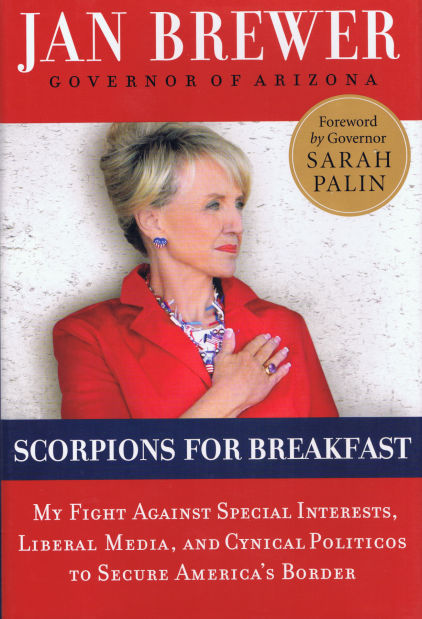PHOENIX — Former Gov. Jan Brewer is not going to have to give the notes she used for her “Scorpions for Breakfast” book to groups challenging the controversial immigration law she signed — at least not now.
U.S. District Court Judge Susan Bolton has rejected arguments by attorneys for immigrant-rights groups that they need the notes to make their case that SB 1070 is unconstitutional because it was enacted with racial bias.
The judge said the notes are not relevant to the case.
But Justin Cox, attorney for the American Civil Liberties Union, said last week this may not be the end of the matter. The ruling could become part of any appellate court review if Bolton ultimately rejects the challenge to what’s left of the 2010 law, he said.
The statute contained multiple provisions that proponents said were designed to give Arizona more power to deal with illegal immigration.
Many of the sections already have been declared illegal by federal courts. But the U.S. Supreme Court refused to void a key provision which requires police who stop people for any reason to question them about their immigration status if there is reason to believe they have no legal right to be in this country.
The justices said there is nothing inherently illegal about that. But they left the door open for challenges on other grounds.
Now the ACLU and other groups are attempting to show that state lawmakers and Brewer crafted the law not out of a real concern about immigration but instead out of racial “animus.”
That, they believe, would force Bolton to block enforcement.
Cox said that does not require challengers to prove that those involved in crafting the bill are “outright racist.”
“The case law recognizes that elected officials in our day and age aren’t going to come out and say things that make it obvious that they’re racist,” he said. “They’re just not that dumb anymore.”
Instead, Cox said attorneys are looking for other indicators, including specific changes made to the legislation as it proceeded through the process, changes that it could be argued show an intent to harass Hispanics as opposed to dealing with illegal immigration.
Most of the subpoena efforts so far have been aimed at those who were in the Legislature at the time, notably former Senate President Russell Pearce, who says he was the architect of the legislation. He surrendered some documents and answered questions before the judge granted his motion to stop further inquiry.
But Cox said that doesn’t let Brewer off the hook — especially given the claims she made in her book.
“Her book says she was the one, her staff, was responsible for the language of SB 1070 and what it says and what it doesn’t say,” he said. Cox conceded he has his doubts.
“I think a lot of it is completely overblown, if not outright false,” he said. “It’s a political book. But if what she says is true, then she was deeply involved, and therefore the documents that reflect that kind of involvement are relevant for the precise same reasons that Russell Pearce’s documents are relevant.”
In arguing against disclosure, Robert Henry, attorney for the former governor, said there has never been an allegation that Brewer acted improperly in signing the legislation.
Whatever thoughts she may have had about the measure “have absolutely no relevance,” he said.
Henry also claimed that writing a book gave his client the same “qualified privilege” that journalists have in protecting their materials and notes.







